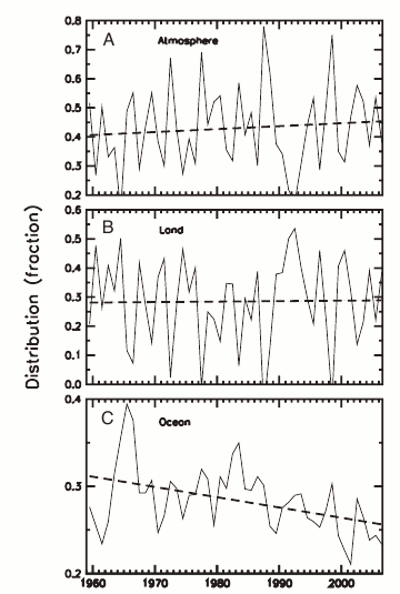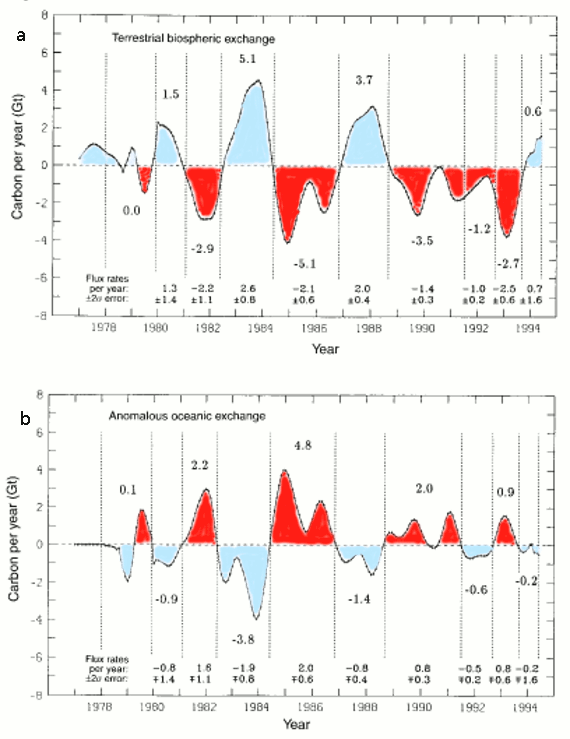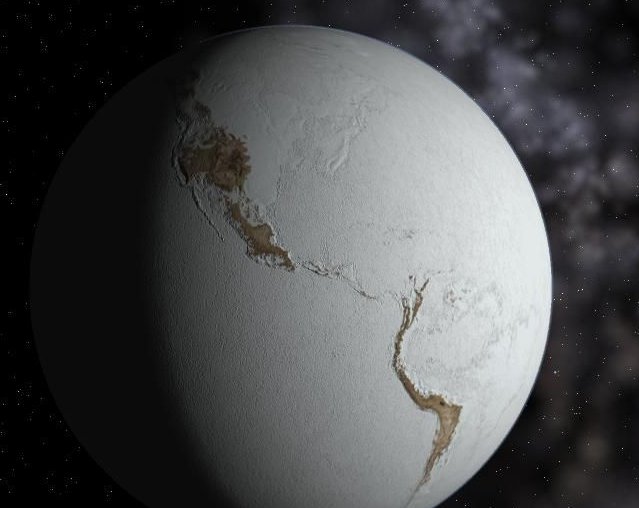Murry Salby - Confused About The Carbon Cycle
Posted on 13 August 2011 by Rob Painting
Every year humans release about 30 billion tons of carbon dioxide (CO2) into the atmosphere through the burning of fossil fuels, such as coal and oil. This is causing the Earth to warm by disrupting the biological (fast) carbon cycle, and is therefore increasing the Greenhouse Effect. Although there are large annual fluctuations in carbon dioxide, as it is exchanged back-and-forth between the atmosphere, oceans, soils, and forests, just under half of human emissions (the airborne fraction) remain in the air because the oceans, soils and forests are unable to absorb all of it. As a result, carbon dioxide has been steadily accumulating in the atmosphere.

Figure 1 - Fraction of the total human emissions (fossil fuel burning & land use change) that remain in the: a) atmosphere, b) land vegetation and soil, c) the oceans. From Canadell (2007)
Murry Salby, a professor at Macquarie University in Sydney, Australia, has an upcoming paper that attempts to pin the current rise in carbon dioxide on rising temperatures. Having listened to a podcast of a talk Salby gave at the Sydney Institute earlier this week, he demonstrates a remarkably poor understanding of the carbon cycle, and his hypothesis seems to stem from this fundamental misunderstanding.
Salby's carbon cycle confusion
Professor Salby refers to a number of graphs in his talk, but I have been unable to track down copies of these, therefore we'll have to rely on what I'm able to glean from the podcast, and given it's length, I'll only address some of the more obvious mistakes. At the beginning of the talk Salby states:
"current CO2 values are 380pmmv"(parts per million by volume)
Not an encouraging start that he cites the atmospheric CO2 concentration as it was in 2005, rather than the 393 parts per million by volume (ppmv) it currently is in 2011. Not a fatal flaw of course, but not encouraging either.
"Net annual emission has an average increase of about 1.5ppmv per year. We're on the right planet. That's the annual average increase you just saw. But it varies between years, dramatically by over 100%. From nearly zero in some years to 3ppmv in others. Net global emission of CO2 changes independently of of the human contribution"
At this point the accentuation and drama in Salby's voice make it sound as though he has stumbled onto something momentous, something no one else has noticed before. On the face of it, it seems preposterous that the army of scientists that have worked on carbon cycling over the years could have missed something so glaringly obvious. No, of course they haven't.
As discussed in the first paragraph of this post (and evident in Figure 1), the natural flux of CO2 in and out of natural systems varies from year-to-year. This flux is 20-30 times larger than the annual contribution by humans, but this balances out in the long-term. This variability is driven largely by El Nino and La Nina in the tropical Pacific, which shifts rainfall patterns over much of the world and is associated with warming and cooling of equatorial waters in the Pacific. The change in seawater temperature, and episodic upwelling of carbon-rich deep water, significantly affects the uptake and outgassing of CO2 from the oceans, and of course rainfall variation greatly affects plant growth.
The upshot is that land vegetation takes up more CO2 during La Nina, and expels more CO2 during El Nino. In the ocean, the opposite trend occurs - El Nino leads to more CO2 absorption, and La Nina is when the oceans give up more CO2 (Figure 2).

Figure 2 - (a) time trend in the exchange of CO2 by land-based vegetation (& soil microbes) with the atmosphere. (b) same - but for exchange of CO2 by ocean with atmosphere. Red indicates El Nino and blue La Nina phase. See Keeling (1995).
There is simply no reason why the annual fluctuation should match the human contribution. At least Salby doesn't explain why he expects this to be the case.
Having now convinced himself that short-term net CO2 has nothing to do with the human contribution, Salby therefore deduces long-term net CO2 must also be unrelated to human emissions. He goes on to derive a formula for CO2 rise associated with temperature. Salby claims a good match back to 1960 but therefafter it deviates from actual CO2 measurements by 10ppmv. By 1880, prior to atmospheric CO2 sampling, he estimates atmospheric CO2 at 275ppmv with a whopping uncertainty of 220 to 330ppmv!
In order to explain the deviation between the surface temperature record and his calculated atmospheric CO2 level, Salby blames the surface temperature record as being unreliable. As for his calculated trend disagreeing with the ice core record for the year 1880 (i.e the CO2 in air, from that period, trapped in ice cores) he 'disses' the ice core record claiming it to be only a 'proxy'. Which is news, I'm sure, to respected ice core experts like Dr Richard Alley.
You will note that every time the data disagrees with Salby's 'model', he trusts his 'model' over the data. Which contravenes the 'skeptic lore' that models are worthless and must be bashed, and only data should be trusted.
Q&A time - try not to shoot yourself in the foot!
The question & answer session at the end of Salby's talk throws up a few more comments that just reinforce that he has strayed into a field of science which he just simply doesn't understand. Witness:
"I think it's a pitfall that people look at the ice proxy of CO2 and take it literally. It's not atmospheric CO2, and I don't believe it's CO2 that was even in the atmosphere when that piece of snow was layed down"
This is nonsense. Perhaps Professor Salby should have acquainted himself with glaciology research before making such comments, because CO2 from ancient air trapped in the ice cores is precisely what is measured, albeit with some uncertainty in dating some sections.
"CO2 after the turn of the (21st) century continued to increase, in fact if anything slightly faster, but global temperature didn't. If anything it decreased in the first decade of the 21st century. Now I'm confident the IPCC (Intergovernmental Panel on Climate Change) will come up with an explanation, in fact they've come up with several"
It's here we need to back the truck up a bit. Salby's entire premise is that CO2 in the air directly dependent upon temperature - increase temperature and you increase CO2. Yet here he argues that CO2 can increase without an accompanying increase in temperature. Which contradicts his 'model'. By this time Salby is too focused on 'dissing' the IPCC to notice his own incoherency, and none of the audience picks up on this either.
Note that SkS recently discussed the 'noughties slow-down' in global temperature here and here.
If the curve fits
Seasoned readers will notice similarities between this Salby claim and a Lon Hocker rebuttal here at SkS last year. But the whole premise seems to follow along the lines of other recent flawed works tendered by Roy Spencer and Craig Loehle & Nicola Scafetta. That is: find some tenuous statistical relationship between two sets of data, and use these to assert the mainstream scientific establishment is wrong. The fact that there is no physical basis for the statistical relationship, or it doesn't fit within the well-established scientific framework, or is contrary to numerous other sets of data, never seems to warrant attention by "skeptic" scientists. It should, because of the implications one can draw.
So what does this work by Salby imply, if it were true? From what I can gather from Salby's podcast, a 0.8°C change in average surface temperature is supposed to lead to about 120ppmv change in CO2. Therefore we can work backward in time to estimate what he reckons atmospheric CO2 would be at the time of the last Ice Age (glacial maximum), a time when global temperatures were about 4-6°C cooler than now . Today atmospheric CO2 is about 393ppm, so with 4°C cooling you already have a negative value for CO2 when we re-trace our steps back to the last ice age. Therefore all plant-based life on Earth must have died (and all the animals that depended on them) according to Professor Salby. And the Earth froze solid too.

Figure 3 - the last Ice Age according to Murry Salby? Fictional image from celestiamotherlode.net
Science - a description of reality, but YMMV
Without viewing Salby's calculations on the temperature/net global CO2 relationship, it's not possible to provide the 'killer blow' to his assertions; however, I don't believe that's necessary, considering the many flaws in Salby's work and fundamental reasoning.
The gradual increase in atmospheric CO2 is less than the total emissions of CO2 from human sources, so by elementary deduction, the excess must be going into the oceans, forests and soils, the other components of the fast carbon cycle.
A tell-tale signature of human fossil fuel emissions is the large fraction of CO2 being driven into the oceans. According to Henry's Law, we would expect the oceans to absorb more CO2 as the air above it becomes increasingly saturated with CO2. In other words the CO2 must be coming from a source external to the fast carbon cycle. This is supported by measurements showing that CO2 is accumulating in the ocean, and is reflected in the declining oceanic pH, showing the ocean is actually gaining CO2 over the long-term, not losing it, as Salby seems to believe.
We also know that the world's land vegetation has increased in mass - through re-growth in forests in the Northern Hemisphere, and CO2 fertilization of tropical forests. So that is gaining carbon too, and the areas affected are so large, we would expect them to have an effect on atmospheric CO2 levels at a global scale.
There are a host of other problems with Salby's 'model', such as the ice core record, and where the warming came from in the first place, but there's no need to go into these details when the fundamental premise of Salby's argument is so clearly wrong.
This blog post has been used as a rebuttal to the climate myth "Murry Salby finds CO2 rise is natural" which can be found at http://sks.to/salby































 Arguments
Arguments






























[DB] It would be best for everyone to refrain from such introspection into Salby's motivation.
[DB] Dale, denier in this context is being used for those who deny observable data and trends (indeed, to the point of saying blue is green and the sun orbits the Earth).
At this point, those who say that "this is what the science says" and back it up with links to peer-reviewed published literature are hardly preaching doctrine. That you phrase it in that context is revealing as to the ideology underlying your position. It is a false equivalency to say that in this scientific dialogue that there are "two sides", unless you mean one side that is backed by 200 years of science and physical observations and the other side which is basically saying "no it isn't" without anything to support their nay-saying.
In that regard and context, yes, they are deniers and denialists. QED.
Note further that the resident skeptics who regularly inhabit SkS are nowhere to be found on a thread like this and in the various ongoing discussions with Mr. Cotton; that would violate the "Skeptic's Code". Aargh.
[DB] "the fact we still really don't know how each part of the system inter-relates and feeds back on itself"
When you say "we" you really mean "I". The people who've made a profession of studying climate science actually have a pretty good handle on all of the things you mention. That you characterize it as being (in large part) uncertain merely demonstrates that you haven't put much time and energy into its study.
Albatross, being a working scientist in the field, speaks from a point of strength of knowledge about the subject.
Per Dictionary.com:
preach
1. to proclaim or make known by sermon (the gospel, good tidings, etc.).
doc·trine
[dok-trin][DB] Please have a care with the inflammatory tone and rhetoric. The next comment constructed in this fashion will simply be deleted.